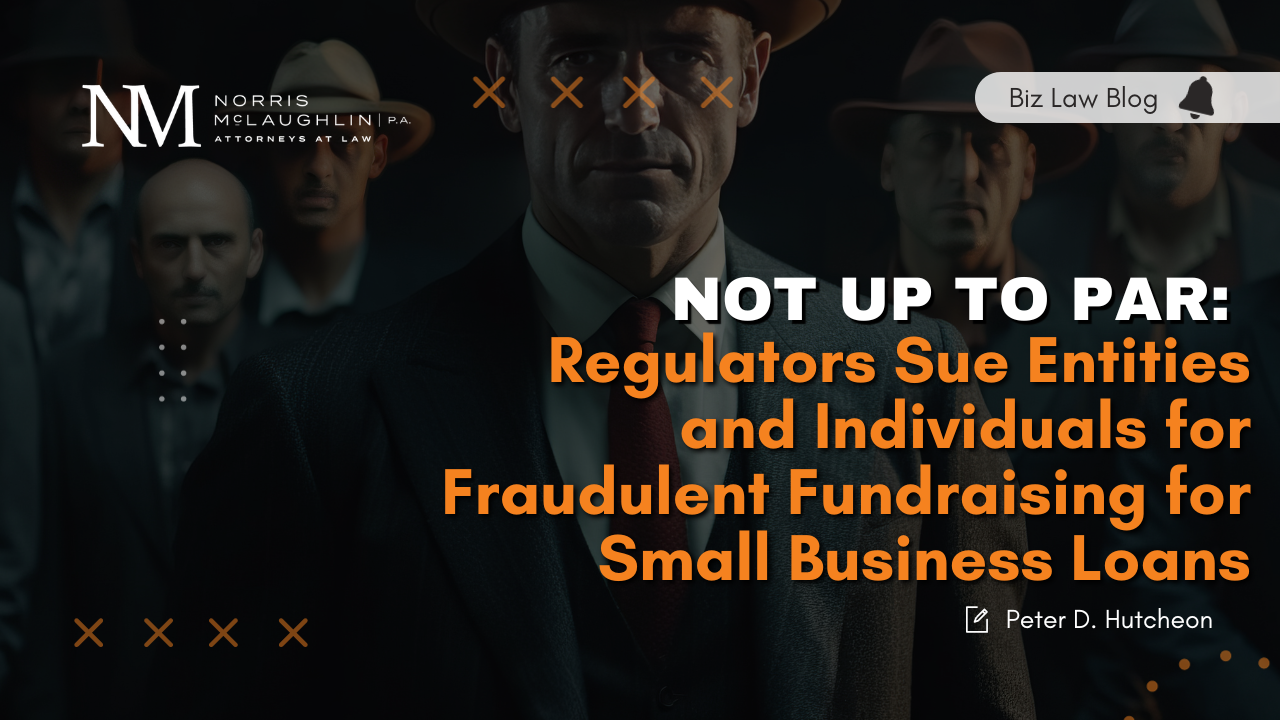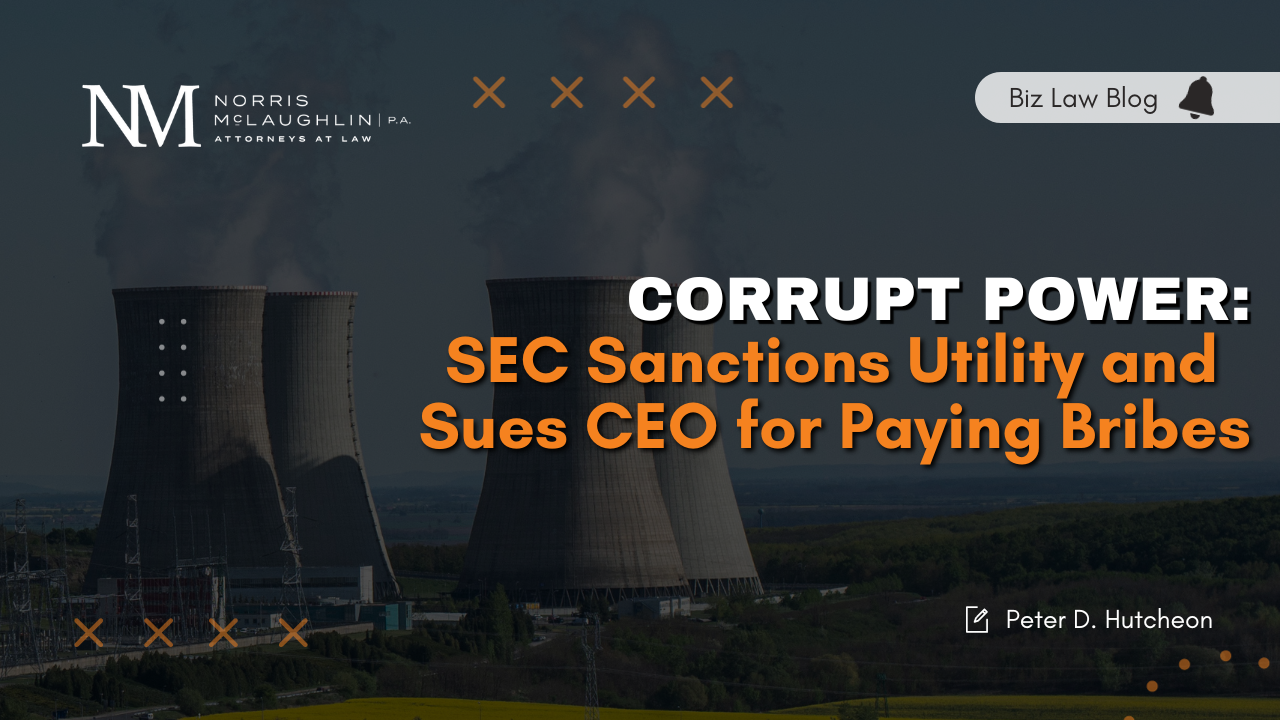Investment Esoterica: A Stockless Triptych

One of the consequences of the last 13+ years of Quantitative Easing has been an indefatigable search for better investment returns. Although the recent rediscovery of inflation by the Federal Open Market Committee of the Board of Governors of the Federal Reserve System has resulted in significant increases in the federal fund rate (the 10-year Treasury Note now yields over 3.2 %), investors have been quite adventuresome in “placing their bets.” Some aspects of that phenomena have surely been reflected in the boom of the so-called “Reddit Mob” investors in “meme stocks.” See in that connection my Feb. 2, 2021, Blog “Rupture Rapture: Should the Game Stop?” That phenomenon of reaching for returns can cause investors to take on risks that, in hindsight, seem unwise; indeed, it can make those investors much more vulnerable to fraud. Below are three recent enforcement actions brought by the U.S. Securities and Exchange Commission (“SEC”) against those who tried to exploit investors hungry for higher profits by offering unusual “investments.”
FIRST: On Wednesday, Aug. 10, 2022, the SEC filed a Complaint (the “Complaint”) in the federal court for the Western District of Oklahoma against two individuals, Gene D. Larson (“Larson”), age 78, a resident of Mesa, Arizona; and Gregory K. Womack (“Womack”), age 58, a resident of Edmond, Oklahoma, and the holder of a FINRA Series 65 license and a registered investment adviser of five states. Larson and Womack were the co-owners and co-managers (Larson has since retired) of GreneCo, an Oklahoma limited liability company (the “Grene”), headquartered in Edmond. Grene was the manager of four real estate projects, each conducted by a separate Oklahoma limited liability company (the “LLCs”). Womack is also the sole owner of Womack Investment Advisers, Inc. (“WIA”), an Oklahoma corporation, and a registered investment adviser in Oklahoma. In 2017 and 2018, according to the Complaint, Grene and its owners raised over $23 million from more than 250 investors who purchased membership units in one or more of the LLCs to fund the beginning (12%-20%) development of the respective projects (an oil storage depot, a multi-story office building, condominiums, and cabin-style homes). The offering material claimed property values for each project based on its value when completed. While investors had options to continue through completion of a project or to hold the partially developed property for future gain, the investments were primarily marketed by the defendants for use for donation to organizations qualified under the Internal Revenue Code to receive grants of conservation easements, yielding substantial tax benefits to the donor.
Neither the offering documents nor statements by Womack at “educational” dinners he hosted in Edmond disclosed that Grene received management fees (ranging from 28.7% to 74.3% of the amounts raised from investors) from the LLCs. Nor did Womack disclose, with respect to eight WIA clients who invested, that he received management fees from the LLCs. Further, Womack filed an annual form ADV with the Oklahoma Department of Securities on behalf of WIA, that failed to disclose accurately WIA’s and his direct financial stakes in the projects. The offerings were sold as private investments without registration under the Securities Act of 1933, as amended (the “33 Act”), with only a cursory effort to determine if each investor was an Accredited Investor. For an in-depth explanation of who is an Accredited Investor, see my Sept. 15, 2020, Blog “‘Accredited Investor’: Regulatory Design, the Revised Definition, and the Unfinished Result.” The Complaint charged Grene, Larson, and Womack with violating Section 5 of the 33 Act for selling securities without a registration statement (or a statutory exemption, none of which were available) in effect. The Complaint also charged Womack and WIA with violating the antifraud provisions of Section 206(2) of the Investment Advisers Act of 1940, as amended. Grene, Larson, and Womack consented to the entry of a judgment against them permanently enjoining them from violating Section 5; and imposing civil penalties of $414,364 (Grene), $41,440 (Larson), and $186,471 (Womack). Womack also agreed to disgorge $236,349 plus prejudgment interest. WIA agreed to disgorge $160,000 plus prejudgment interest and to pay a civil penalty of $517,955. Neither the Complaint nor the Aug. 10, 2022, SEC Press Release reveals what, if any, success any of the investors may have had in obtaining tax benefits from donating conservation easements on the project in which they invested.
SECOND: On the same day, Wednesday, Aug. 10, 2022, the SEC brought charges against Angel Oak Capital Advisors, LLC (“Angel”), an SEC registered investment adviser based in Atlanta, Georgia, and one of Angel’s senior portfolio managers, Ashish Negandhi (“Manager”), in an Administrative and Cease-and-Desist Proceeding (the “Proceeding”) for violations of Sections 17(a)(2) and (a)(3) [selling securities without true and complete information and engaging in transactions that deceive the purchaser] of the Securities Act of 1933, as amended (the “33 Act”), and Section 206(2) of the Investment Advisers Act of 1940, as amended (the “40 Act”) [prohibiting an investment adviser from engaging in fraud on a client]. The SEC issued an Order (the “Order”) on Aug. 10, 2022 in the Proceeding, reflecting Respondents’ consent to the entry of sanctions for the alleged violations. Angel, formed in 2009, has $21 billion in assets under management, primarily focused on real estate financed through the origination, service, purchase sale, securitization and investment in non-Agency and non-qualified mortgage loans. Manager, age 52 and an Atlanta resident, has been employed by Angel since 2010 and is on the Whole Loans Team, which purchases entire loans to be securitized by Angel, and monitors their performance after securitization and sale to investors.
In March 2018, Angel raised $90 million from investors from the sale of notes in a pool of (according to the Order) the first ever securitized “fix and flip” loans. Those high interest, short-term loans are made to borrowers so that they can buy, renovate, and sell residential properties. The Order states that shortly after closing on the offering, Angel noted an unexpected increase in the rate of late mortgage payments on loans in the pool. This in turn threatened to breach an early amortization trigger in the securitization documents designed to protect noteholders from losses. Angel and Manager feared the “adverse harm to the firm” [emphasis added] from early amortization so soon after the offering closed, as well as the financial impact on private funds managed by Angel, where the funds held a junior tranche of the notes. To counteract the late payment problem, Angel diverted monies from escrow accounts to make payments on delinquent mortgages; this avoided a November 2018 trigger in the securitization documents requiring early loan repayment. Manager, fully knowledgeable about what was being done, failed to make full disclosure either to the Board of Directors of Angel or to the noteholders in monthly reports issued by Angel. The SEC imposed the following sanctions in the Proceeding: The Respondents must cease and desist from future violations of the cited securities laws; the Respondents are censured; Angel must pay a civil penalty of $1.75 million in four phased payments plus interest; and Manager must pay a civil penalty of $75,000 in five phased payments plus interest. The SEC’s Aug. 10 Press Release about this case notes that its investigation of Angel and Adviser involved the work of the Division of Economic and Risk Analysis, a specialized unit of the Commission formed in 2009 “to integrate financial economics and rigorous data analytics.” In any event, it seems likely that the investors, expecting higher yields from the pool of “fix and flip” loans, found themselves more “flipped” than “fixed.”
THIRD: On Wednesday, Aug. 17, 2022, the SEC sued i) Bellatorum Resources, LLC (“Adviser”), a Texas limited liability company based in Spring, Texas, which although unregistered (with either the SEC or the State of Texas securities regulator), acted “as an investment adviser” to three private funds (“Funds”) organized as Texas limited partnerships; and ii) Christopher R. Bentley (“Bentley”), age 41, of Tomball, Texas, the majority owner, President, and CEO of Adviser, who the SEC alleges “controlled …[Adviser’s] operations and investment decisions,” in the Federal Court for the Southern District of Texas, Houston Division. Bentley “also formed and controlled Bellatorum Management GP (“GP”), which served as the general partner of each of the Funds.” Bentley had never been registered with the Commission as an investment adviser “or in any other capacity.” However, “Bentley formed the Funds to act as investment funds that would buy oil and gas mineral rights and resell them [to institutional investors] for a profit,” according to the SEC’s Aug. 17 Complaint (the “Complaint”). The Complaint asserts that Bentley, through his control of Adviser, raised approximately $31.5 million from approximately 149 investors between February 2019 and April 2021 from the sale of limited partnership interests in the Funds.
According to the Complaint, Bentley i) purchased mineral rights at inflated prices in self-dealing transactions with affiliated entities he owned; ii) purchased mineral rights at inflated prices and then misappropriated the inflated amounts by diverting them to affiliated entities under his control; iii) generated fake profits by manipulating sales transactions; and iv) altered documents to deceive the auditors for two of the Funds. In addition, Bentley secretly borrowed $6.6 million for himself, secured by the Funds’ mineral rights. As a result of the Covid pandemic, the energy markets collapsed, causing Bentley to default on the loan. He then assigned the mineral rights to the lender, resulting in “a nearly complete loss for the Funds and their investors.” Two of the Funds were liquidated in Chapter 7 bankruptcy proceedings, while the third Fund found a new general partner and sold “its few remaining assets.” Bentley, who had “misappropriated at least $880,000 of investor funds …to pay his personal expenses and misappropriated at least $2.06 million… to pay for…[Adviser’s] operating expenses,” turned himself in to the U.S. Attorney’s Office for the Southern District of Texas and the FBI.
The SEC charged the Defendants with violations of: Section 17a) of the Securities Act of 1933, as amended; Section 10(b) of the Securities Exchange Act of 1934, as amended, and Rule 10b-5 thereunder; and Sections 206(1) and (2) of the Investment Advisers Act of 1940, as amended. “As to each Defendant, the SEC seeks permanent injunctive relief, disgorgement of ill-gotten gains plus prejudgment interest, a civil penalty, and all other equitable and ancillary relief to which the Court determines the Commission is entitled. The SEC also seeks an order barring Bentley from serving as an officer or director of a public company.” In addition, the SEC notes in its Aug. 17 Press Release concerning this case that in a parallel action, the U.S. Attorney for the Southern District of Texas has filed criminal charges against Bentley. So, the investors in the three Funds, seeking superior returns from investments in oil and gas mineral rights, learned to their chagrin that they had instead become owners of mineral “wrongs.”
These three cases provide significant restatements of the old adage, “if it sounds too good to be true: it IS.”
If you have any questions concerning this post or any related matter, please feel free to contact me at pdhutcheon@norris-law.com.




